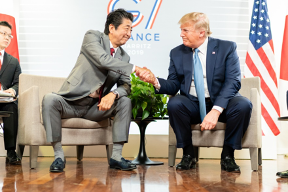Since the end of the Cold War, the United States has expanded its network of formal wartime alliances to include peacetime alliances and partnerships. While some policymakers and Americans, including President Trump, are strongly advocating for the United States to avoid entanglements in far-flung conflicts, it is now more important than ever to honor and strengthen our alliances and partnerships throughout the world in order to counter the growing influence of China.
Alliances of all types – be they military, financial and industrial – exist, ideally, to further the collective interest of all parties by combining their capabilities. While this may not always involve exactly equal contributions or capabilities, all parties benefit to some degree to the partnership. As stated in Jim Cahill’s CSPS blog, Improving the American Debate on the Strategic Value of Alliances and Partnerships, there is a risk of entrapment or entanglement when engaging in partnerships, but the overall utility of these arrangements is ultimately still favorable to the United States.
One of the most visible signs of China’s rising influence on the global stage is the Belt and Road Initiative (BRI), a series of major infrastructure and development projects designed to connect Eurasian countries together. According to former US National Security Advisor John Bolton, China has been deliberately and aggressively undermining US interests and forcing partnerships to advance their global dominance. China is forging partnerships with countries, both willing and coerced through debts owed, that give China a strategic foothold across multiple regions.
Many policy makers believe that BRI is a direct attempt to expand their influence and undermine the United States and international institutions. The primary concern is that Chinese investments can generate economic dependence in many struggling countries which can then lead to political influence. Many countries are either unwilling or unable to decline such an enticing economic proposition, despite the many violations and abuses that accompany it.
Historically, the US has focused on maintaining Asian alliances to maintain a balance of military power in the Indo-Pacific; however, the United States must now offer existing and potential allies an economically appealing partnership to counter Chinese influence. Strengthening existing alliances and building new partnerships in areas of Chinese focus would give the United States’ a strategic ‘leg up’ by supporting the economic development of allies and reaffirming US commitment to the regions.
On the other hand, if countries feel as if the United States is abandoning their partnerships, or is no longer a credible ally or guarantor of their safety, they may choose to align themselves with China. The United States Department of Defense acknowledges that partnerships in these regions is a force multiplier for peace, and that building close relationships between militaries and economies will contribute to enduring trust and stability on the global stage. These partnerships can help ensure a peaceful transition to a bipolar system dominated by two great powers.
Many policy makers and prominent political figures are currently arguing that the United States should abandon many of its overseas alliances and adopt a more isolationist stance on the global stage. However, it is actually more important than ever to honor existing alliances and build future partnerships to ensure that the US can economically, as well as militarily, remain balanced in the context of a rising China. It is not a feasible option in the current global state and interconnected global economy for the US to return to isolationism. Overall, the current alliances that the US has are a means of extending US influence, maintaining stability, and deterring rivals in different regions of the world. As the international community shifts to a bipolar system with the rise of China, these partnerships and alliances are more important than ever.
Rebecca Cooper is a second-year graduate student in the International Security program with a concentration in intelligence. She completed her undergraduate studies at the University of Mississippi with a degree in Political Science and intensive Arabic language study. She currently works at the Intelligence and National Security Alliance and TSA’s Office of Intelligence and Analysis. Her primary interests include intelligence, counterterrorism, and Middle Eastern regional and geopolitical issues.
Photo can be found here.




